Table of Contents
If you are looking for the best influencer marketing platforms, you’ve got plenty of options. Influencer marketing keeps growing, and the right tool can help you find creators, manage campaigns and measure results without endless spreadsheets and invoices or DMs.
In this guide, we’ve gathered some of the leading influencer marketing platforms on the market today, ranging from dedicated discovery tools to all-in-one solutions for campaign management.
An influencer marketing platform is a software that helps brands to plan, run and measure their influencer marketing campaigns. Most platforms offer businesses searchable databases with UGC creators and influencers, as well as tools for outreach, briefs, contracts, payment handling, and analytics that tie activity to performance and results.
After setting up a campaign, brands reach out to influencers who align with the campaign’s purpose, audience, and message. Once both sides agree on what’s expected, such as what to post and when, the sponsored content goes live on the creator’s channel. However, the brand holds the rights to repurpose that content in its own channels.
You can use an influencer marketing platform to make your entire influencer collaboration process smoother and more effective. They also give you valuable insights to see what’s working, optimise your strategy, and turn influencer partnerships into authentic content that builds trust and drives real results for your brand.
Here are some standout influencer marketing platforms. Each offers a different approach to working with creators and measuring results, giving you a clearer view of what’s out there.
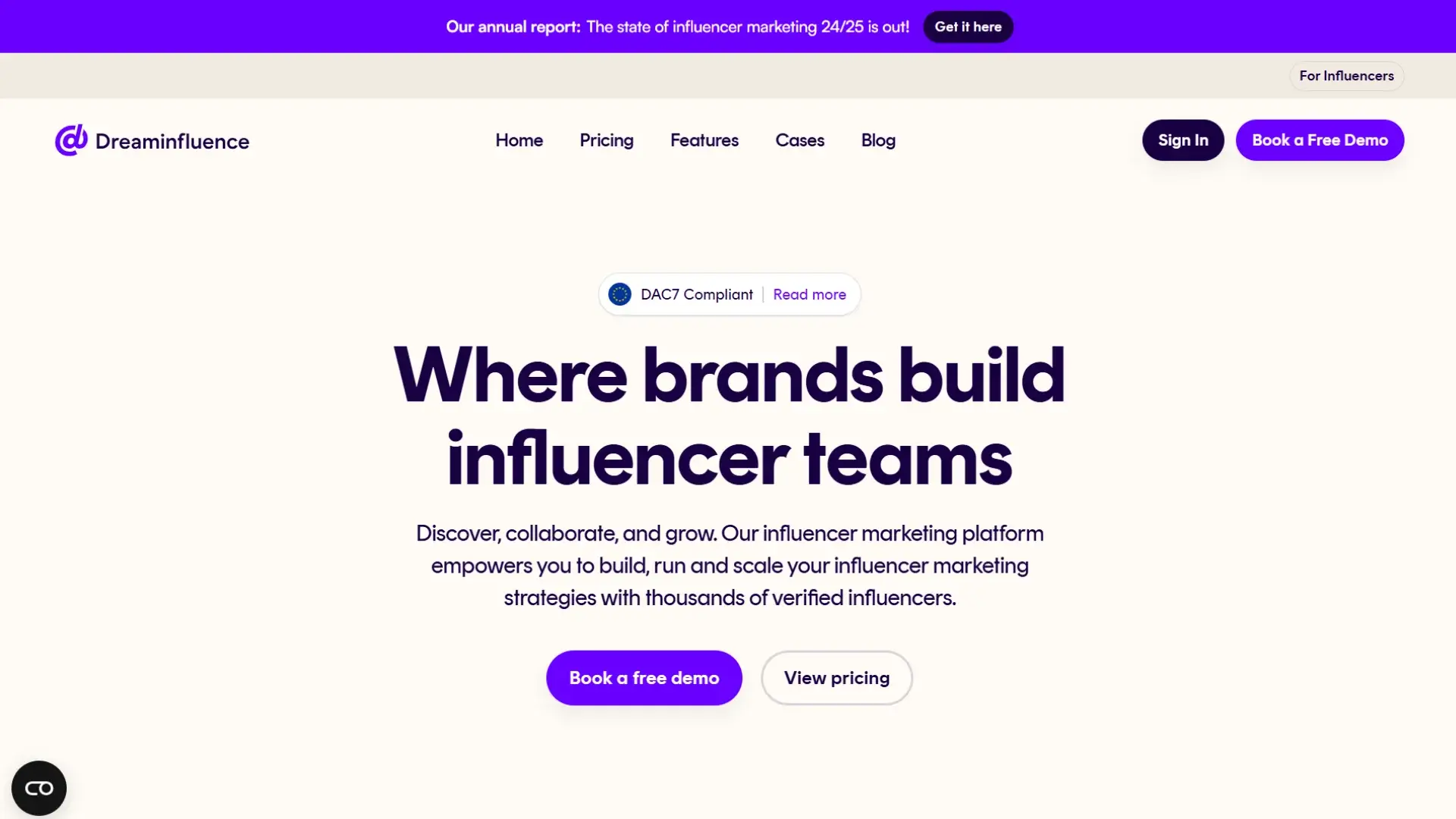
Dreaminfluence (Flowbox) is an influencer marketing platform that helps brands manage every stage of their influencer collaborations, from discovery and briefing to reporting and payments. As a part of Flowbox, it combines influencer management with first-party data and UGC capabilities, creating one connected space for brand-creator partnerships.
When used with Flowbox’s UGC platform, it helps brands generate and distribute influencer content across their own channels to reach more people and build trust. Dreaminfluence’s curated influencer network focuses on verified creators and reliable audience data, helping brands choose partnerships that actually convert.
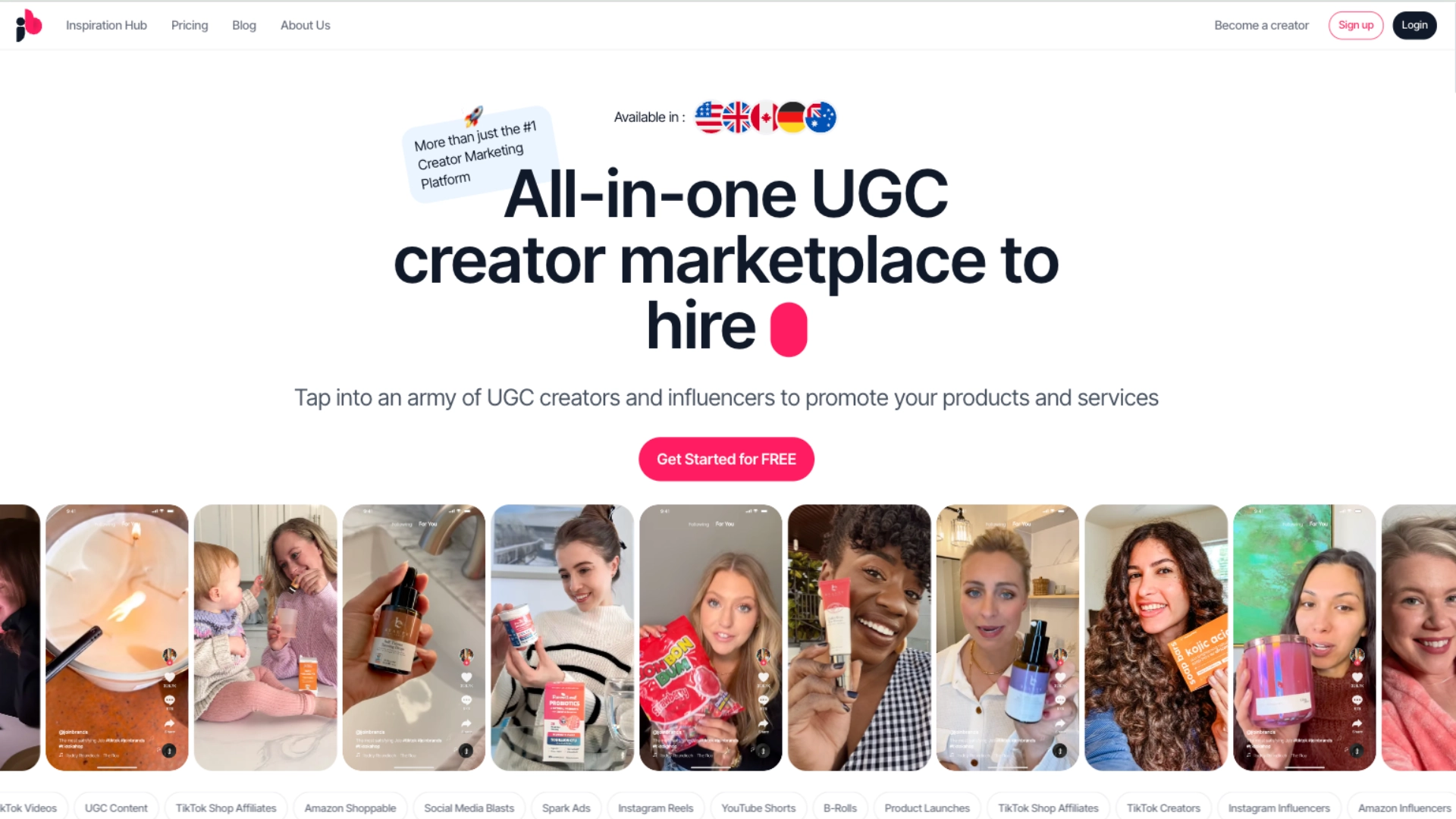
JoinBrands is a UGC and influencer marketplace that helps brands connect with creators, send products, and collect authentic photo and video content. It’s designed to simplify content sourcing by bringing creator discovery, briefing, and delivery into one place.
JoinBrands focuses on speed and scalability. Brands can post briefs, match with vetted creators, and receive licensed assets ready to reuse across ads, product pages, and social channels. The platform also supports affiliate and TikTok Shop collaborations, making it a good option for brands selling online and looking for measurable results.
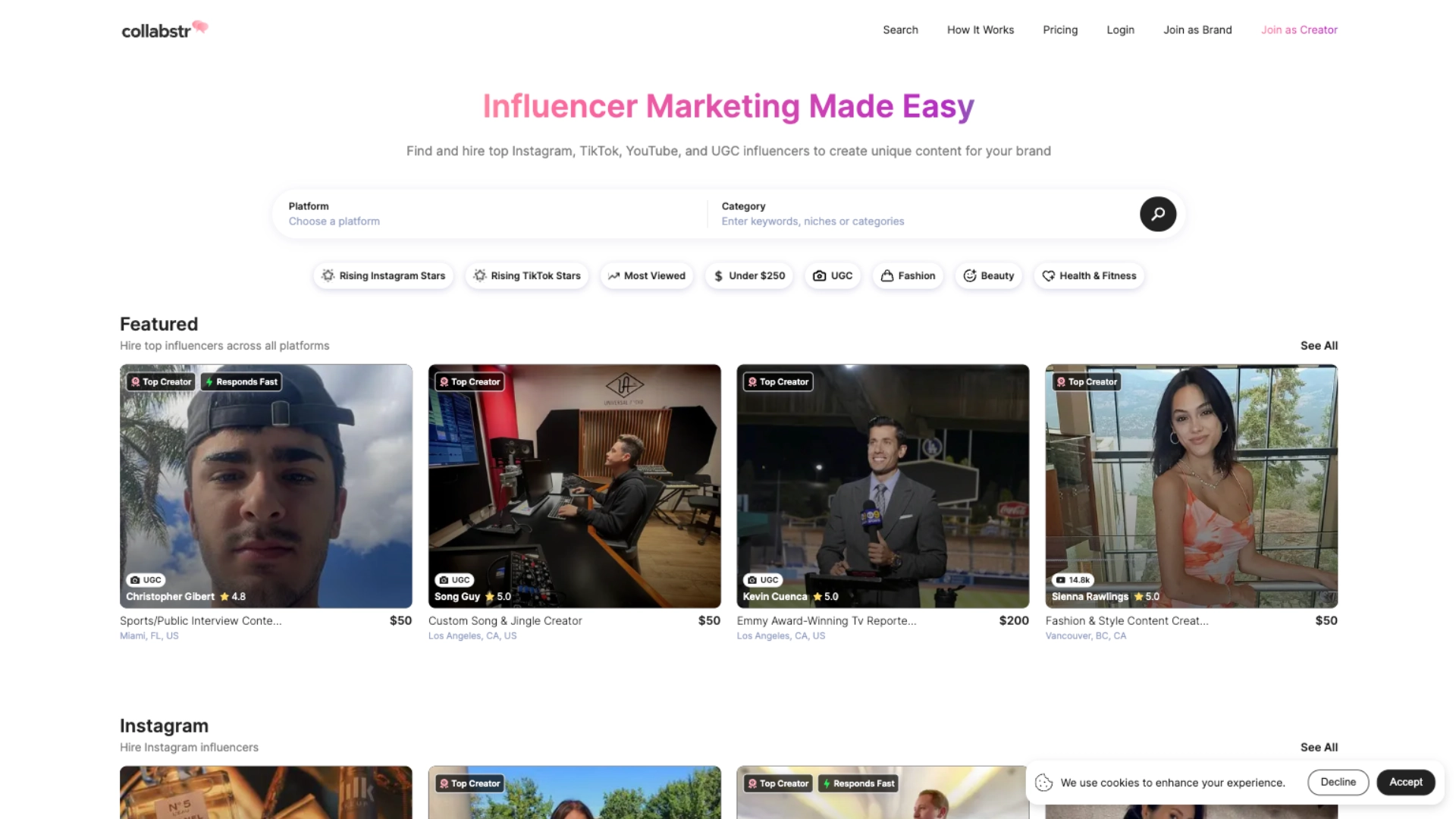
Collabstr is a self-serve marketplace where brands can hire creators on TikTok, Instagram, YouTube, and other platforms to produce sponsored posts or UGC. It’s designed for simplicity, offering transparent pricing, secure payments, and fast turnaround times.
The platform makes it easy to browse thousands of creators, compare pricing packages, and manage communication and delivery in one dashboard. Collabstr’s built-in escrow system ensures that payments are only released once work is completed, which makes it popular with small and mid-sized teams testing influencer collaborations.
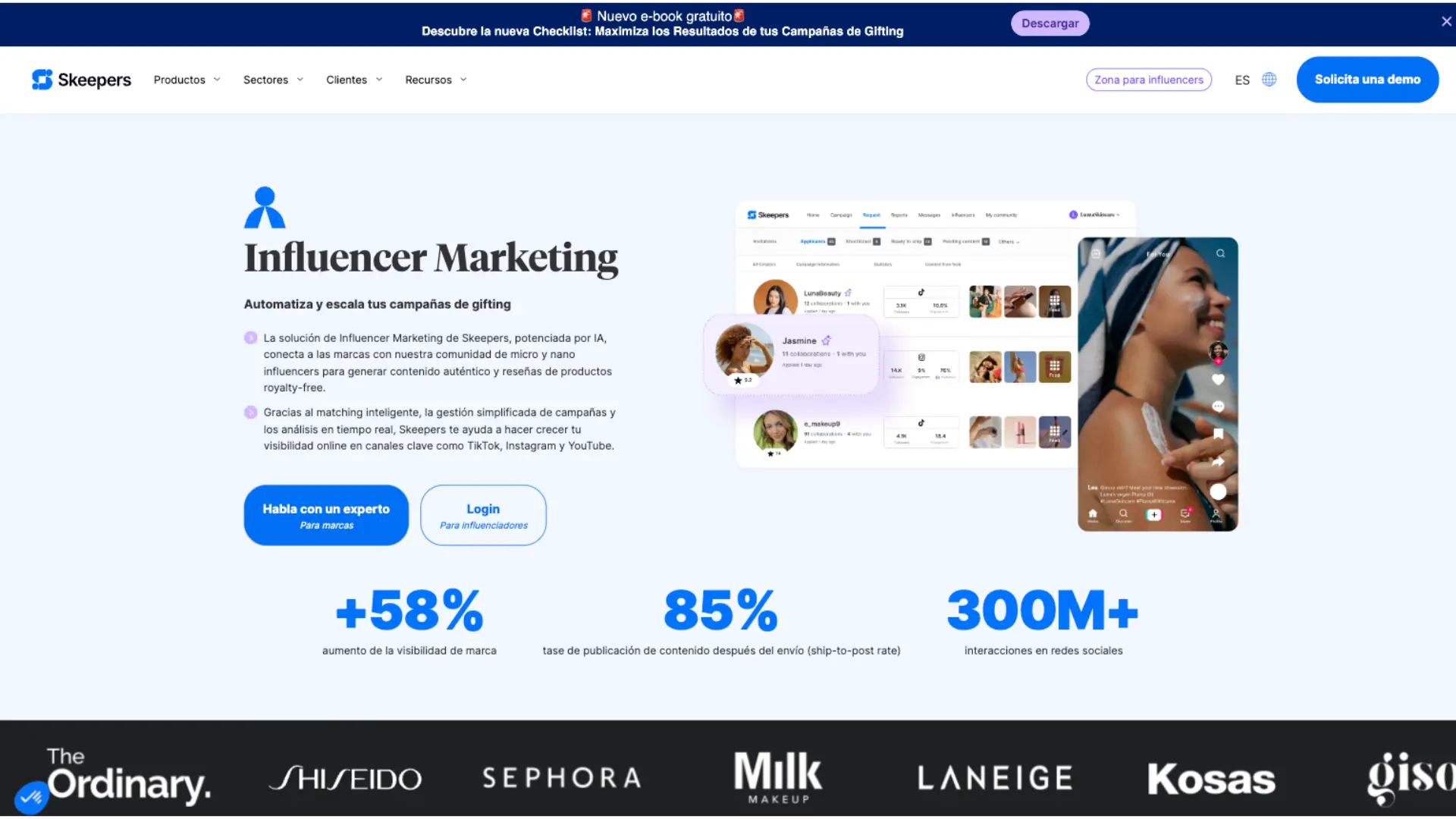
Skeepers is a French martech company focused on AI-powered UGC and influencer solutions that help brands turn authentic customer voices into business results. The group was formed in 2019 and over the years has continued growing through acquisitions.
Skeepers’ influencer product leans into micro and nano creators, automated gifting, and real-time analytics. You get smart matching to a large vetted community, tools to collect licensed content and reviews, and features that connect posts to shoppable moments across TikTok, Instagram, and YouTube.
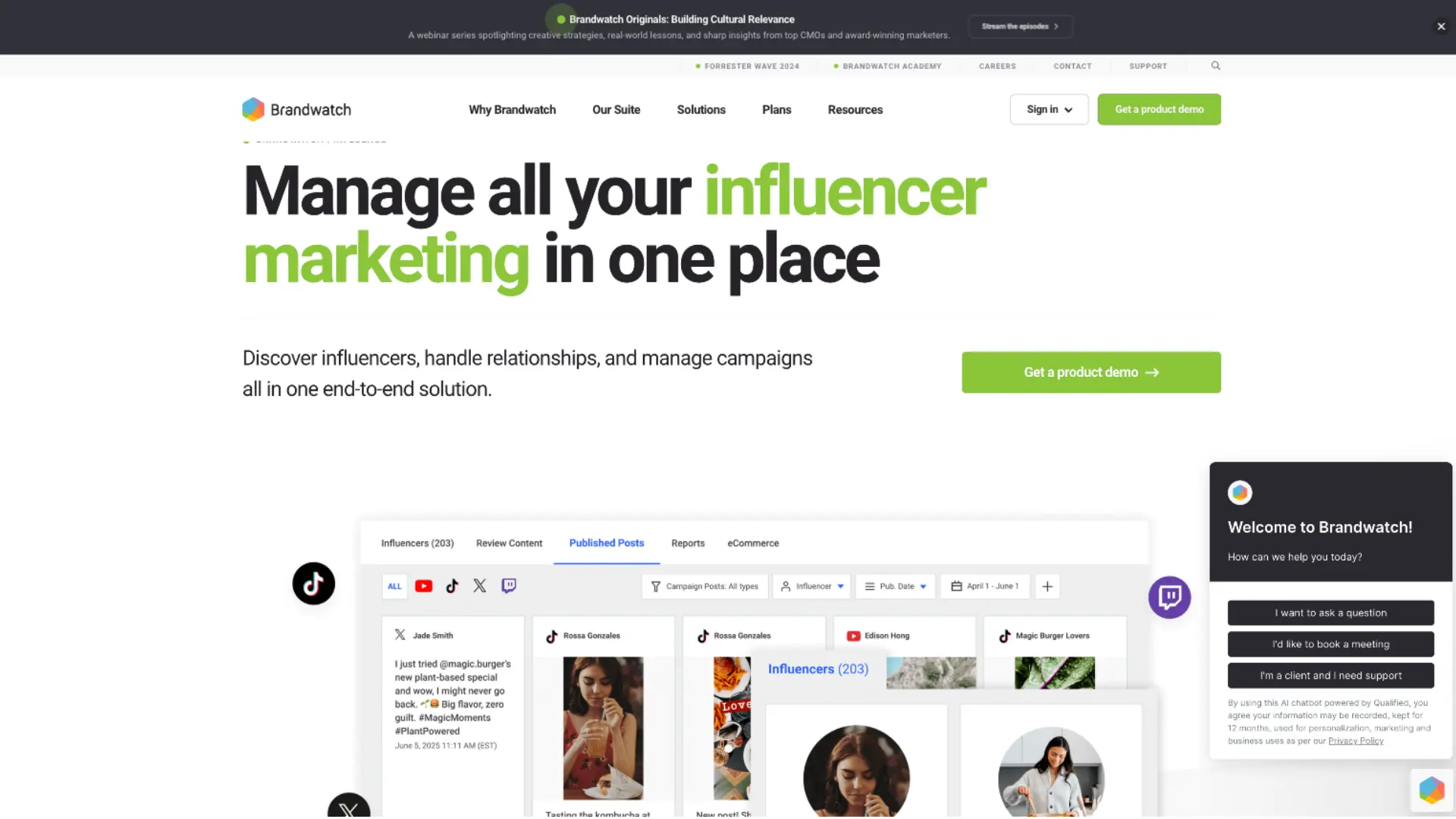
Brandwatch is a digital consumer intelligence company known for social listening, analytics, and social media management. Its influencer solution, Influence, brings creator campaign management into the Brandwatch ecosystem.
With this tool, you can discover and manage creators, track posts and conversions, and pull sentiment or competitor context into your reports. The real strength lies in connecting campaign performance with broader social insights, ensuring decisions are based on more than just vanity metrics.
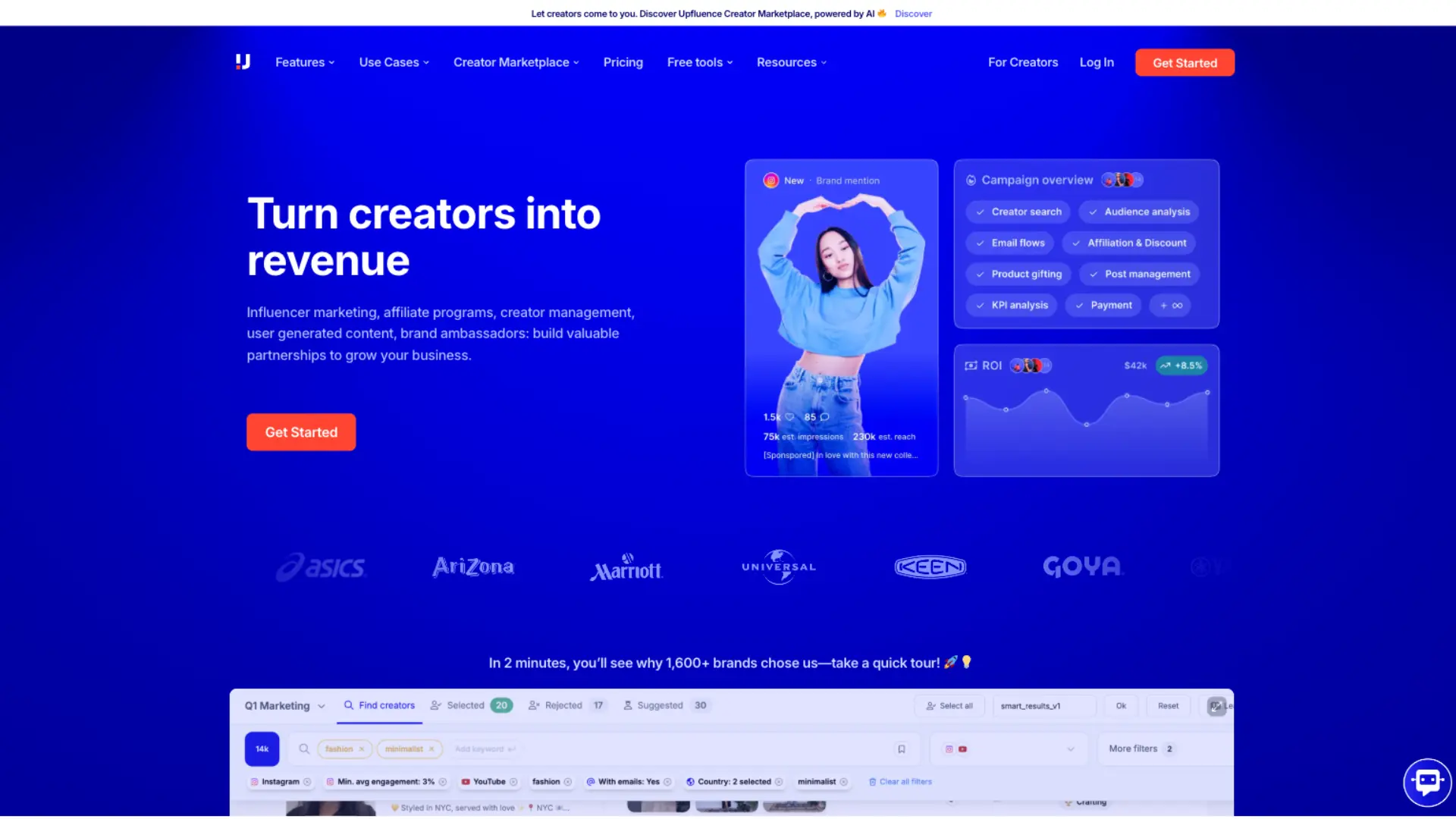
Upfluence provides an all-in-one influencer marketing platform used by brands and agencies to discover creators, manage collaborations, and track performance. It’s widely adopted by e-commerce teams thanks to native integrations and sales attribution via links and codes.
Upfluence is strong on e-commerce. You can find and vet creators, run briefs and approvals, track posts, and see sales tied back to discount codes or affiliate links. The integrations with platforms and ad managers make reporting cleaner, and the built-in outreach tools help keep everything in one place.
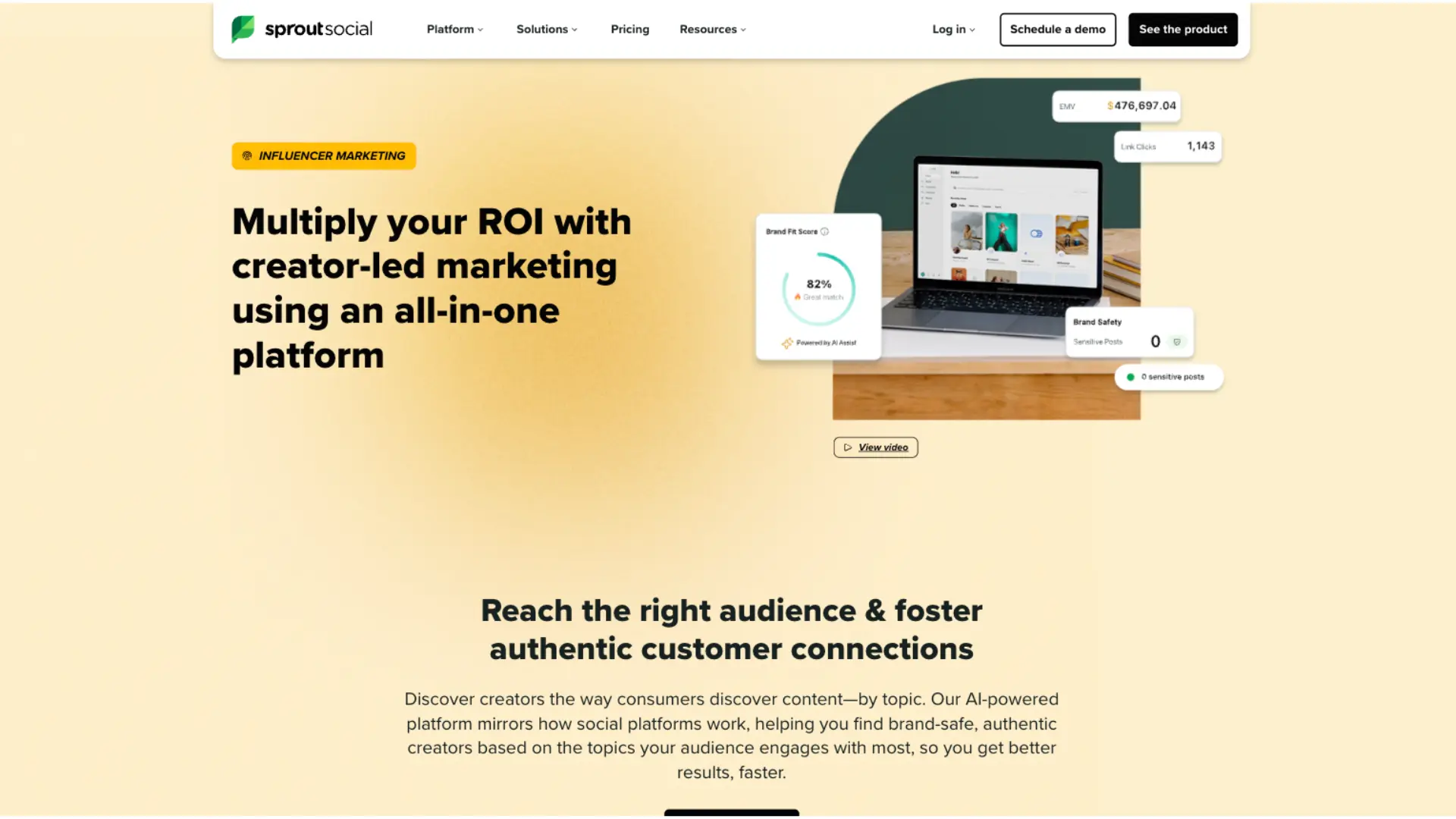
Sprout Social is a social media management company offering publishing, engagement, and analytics. In 2023, it added influencer marketing by acquiring Tagger Media, bringing creator discovery and campaign management into the Sprout Social platform.
The platform enables creator search and analytics, enterprise workflows for briefs and approvals, and reporting that sits alongside your social data. It’s built for larger programs, with cross-market coordination, permissions, and planning that keep big teams aligned.
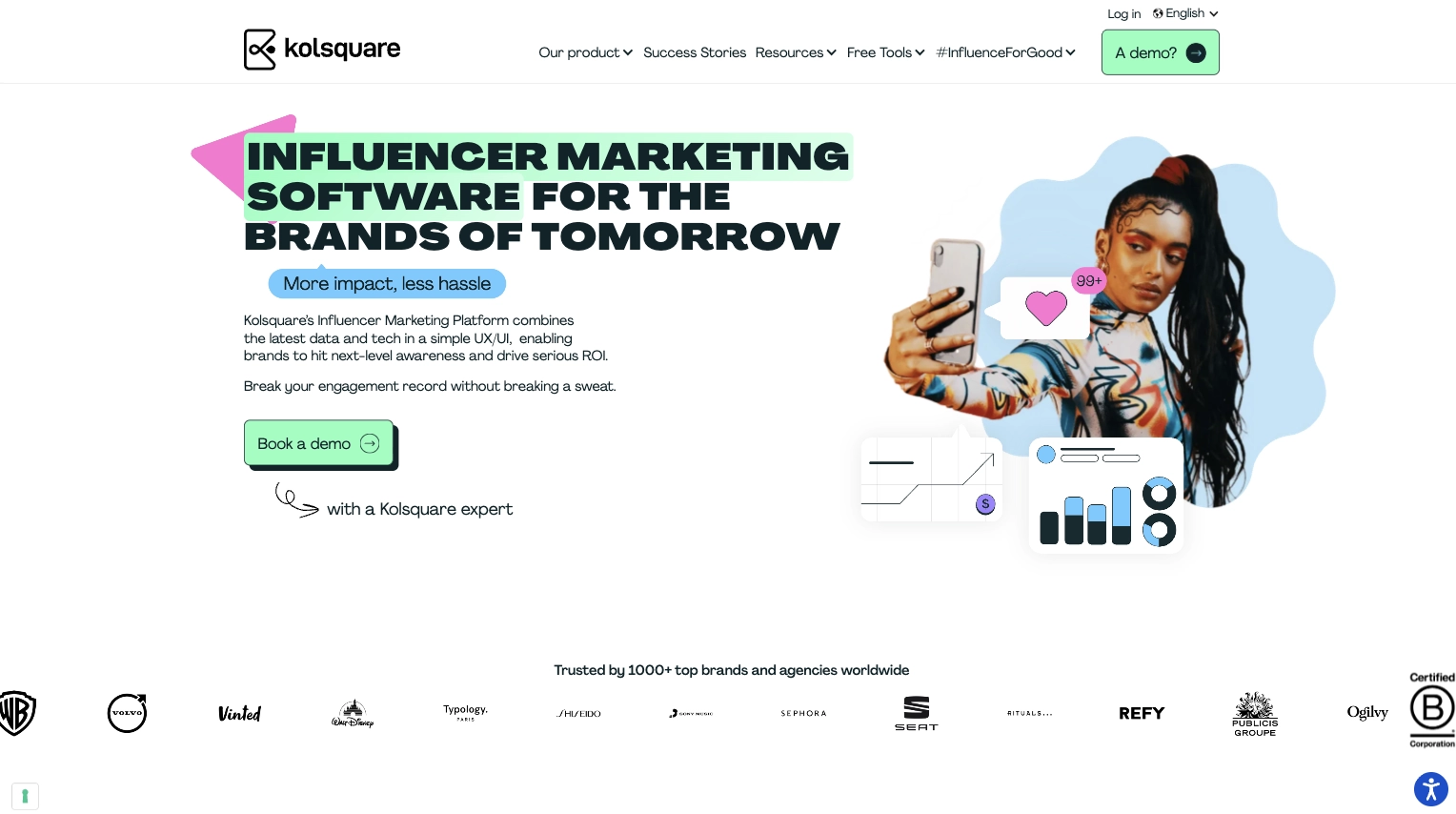
Kolsquare is a European influencer marketing platform that helps brands find creators, run campaigns from A to Z, and measure impact with data-driven reporting. The company positions itself around responsible influence, transparency, and simplicity.
Kolsquare leans into trustworthy data and compliance. You get large-scale creator search, audience insights, campaign tracking, and features like Compliance Score and Credibility Score to check ad-disclosure and authenticity.
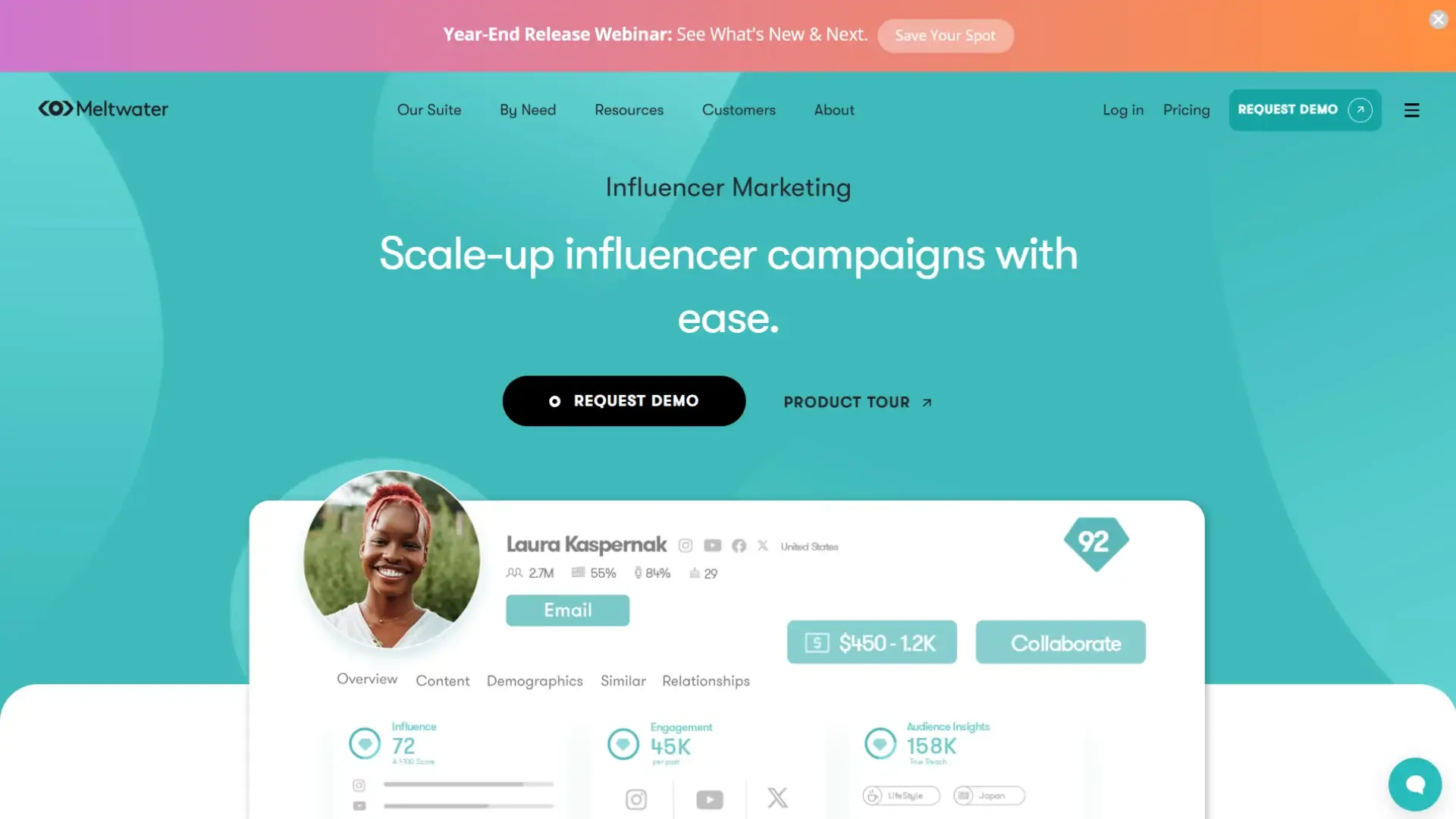
Meltwater’s influencer marketing platform is used by brands and agencies to build, scale, and measure influencer programs across Instagram, TikTok, YouTube, and more. Meltwater acquired Klear in 2021 and now offers it as part of its broader social and consumer intelligence suite.
Meltwater is built for teams that want reliable discovery, solid vetting, and clean reporting without a steep learning curve. You get search with advanced filters, audience and fraud checks, campaign workflows, and eCommerce tie-ins like codes, links, and sales tracking.
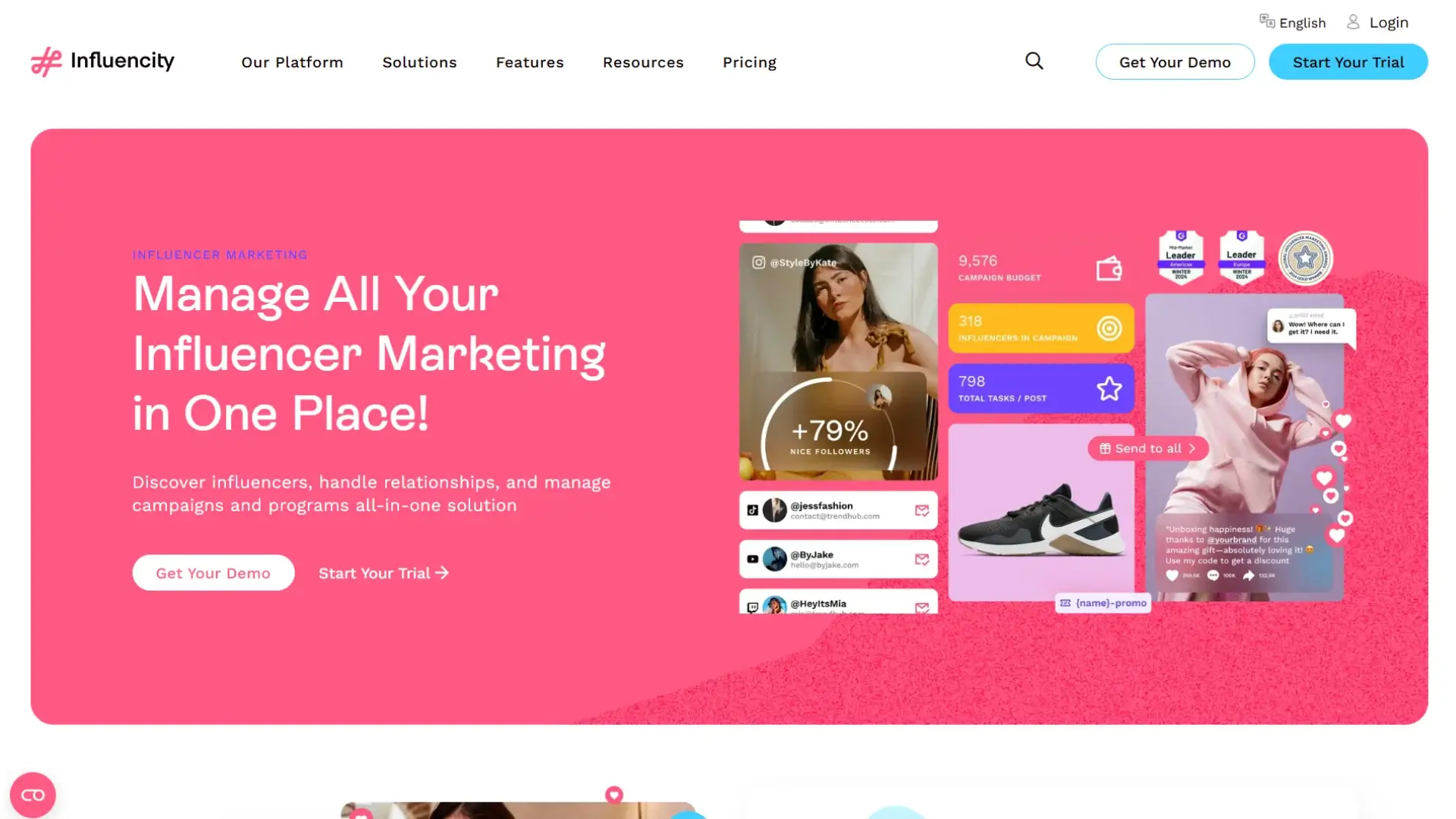
Influencity is an all-in-one influencer marketing platform that helps brands and agencies manage the full campaign lifecycle: from discovery and vetting to execution and reporting. It’s built for teams running ongoing collaborations rather than one-off campaigns.
Within the platform, users can search and analyse creators, manage briefs and timelines, and track results in real time. Features include audience and fraud checks, forecasting tools, and integrations that support affiliate tracking and eCommerce workflows.
Here is a summary of the key features and suitable clients for each influencer marketing platform listed above:
| Brand | Best for | Key features |
|---|---|---|
| 1. Dreaminfluence (Flowbox) | Brands wanting discovery-to-reporting in one flow | Curated creator network, AI matching, audience insights, briefs, payments automation, and performance tracking |
2. JoinBrands | DTC/marketplace sellers needing fast UGC and simple collabs | Self-serve briefs, product seeding, licensed UGC delivery and affiliate/TikTok Shop support |
3. Collabstr | Small–mid teams wanting quick, escrow-protected hires | Marketplace packages, transparent pricing, in-app chat and escrow payments |
| 4. Skeepers | Retail, beauty, and lifestyle teams | Micro/nano programs, gifting, reviews + advocacy and licensed reuse |
| 5. Influence (Brandwatch) | Data-driven enterprise teams | Discovery, campaign tracking, tied to listening and sentiment |
| 6. Upfluence | eCommerce brands focused on sales attribution | Discovery, CRM, codes and links, affiliate tracking, reporting, native eCommerce integrations |
| 7. Sprout Social | Large teams that need roles, permissions, and approval paths | Enterprise workflows, creator analytics, planning and approvals |
| 8. Kolsquare | European brands prioritising compliance and transparency | Creator search, audience credibility scores and ROI reporting |
| 9. Meltwater | Brands and agencies wanting solid end-to-end basics | Discovery, vetting, campaign management and sales attribution |
| 10. Influencity | Brands/agencies running ongoing multi-creator programmes | Discovery and vetting, audience/fraud checks, briefs, timelines, reporting and forecasting |
Choosing the right influencer marketing platform depends on your goals, budget, and how your team works. Some brands prioritise discovery and data, while others want an all-in-one tool that also handles UGC, payments, and analytics.
The best fit is the one that makes your influencer program easier to manage and genuinely improves your results.
Before deciding, take time to compare how each platform aligns with your strategy. Look beyond surface features and think about workflow, integrations, and support. Asking the right questions during demos will help you see which platform is built for long-term success.
What should you be looking for in an influencer marketing platform?
The right platform should simplify your workflow, support your goals, and make influencer marketing feel effortless.
The most common mistakes are chasing follower counts and overlooking what actually drives results. Big followings can look impressive, but they rarely guarantee engagement or conversions. A smaller creator with a passionate community often outperforms a larger account with passive followers.
Always make sure that the platform fits your current setup and helps you make the most of the content you collect. Look for integrations with Shopify or WooCommerce, Google Analytics, and ad managers like Meta, TikTok, and Google. You’ll want tools for rights management and whitelisting so you can reuse top-performing posts across ads, emails, and product pages.
Ensure that you fully understand the costs. Ask about transaction fees, influencer payment handling, extra seats, and add-on analytics. Make sure you choose the right platform and the right tier/payment plan for your business.
Request a demo with Flowbox to build and scale your UGC and influencer marketing strategy cost-effectively.
Here are some frequently asked questions regarding influencer marketing platforms:
An influencer marketing platform is a software that helps brands to plan, run and measure their influencer marketing campaigns.
Most platforms offer businesses searchable databases with UGC creators and influencers, as well as tools for outreach, briefs, contracts, payment handling, and analytics that tie activity to performance and results.
Everyone from start-ups and scale-ups to global brands across fashion, beauty, travel, fitness, consumer goods and lifestyle. Inside organisations, they’re typically owned by marketing managers, social leads, PR and eCommerce teams. The aim is straightforward: organised workflows and clear results.
Agencies suit brands that need strategy, creative and execution without adding headcount. They bring expertise and bandwidth but can cost more and give less day-to-day visibility. Platforms suit teams that want control, transparency and in-house speed while building capability. Many brands use both: agency for major launches, platform for always-on programmes and reporting
Good platforms use built-in fraud detection to spot fake followers and inflated engagement. They analyse audience quality, flag sudden spikes or bot-like patterns, and compare engagement to follower size. Some verify creator identities and track audience changes over time. These checks help brands invest in creators with real influence and genuine reach.
Yes. Many influencer marketing platforms now offer affordable plans for smaller teams. They cover essentials like creator discovery, outreach and basic analytics. Small and local brands often see great results by partnering with micro or nano creators. These creators have highly engaged communities and strong local trust that drives real impact.